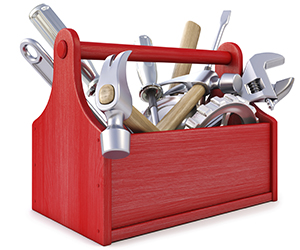The Essential Tools For Every Do It Yourselfer

Ah, the toolkit. Nothing prepares a person better for those inevitable DIY tasks that come with homeownership. No home should be without a good toolkit. That said, most folks don’t need a mountain of expensive tools to tackle those typical household jobs.
So What Should Your Toolbox Consist Of?
Here are some of the tools you’ll be reaching for most of the time:
Toolbox
How else are you going to lug everything around? A trusty toolbox combines space for your gear, compartments to keep it all organized, and durability for carrying everything from one place to another. Tools get heavy, so consider spending a few more bucks to get a box that’ll last a long time.
Claw hammer
While many different kinds of hammers exist, few have the versatility to drive new nails, remove old ones, and fend off zombies. Claw hammers are a handyman’s best friend and are one tool every person should have.
Screwdrivers
If you have ever tried to assemble a flat-pack piece of furniture or other item, you know how frustrating it can be using that poorly-designed included screwdriver. Having a nice set of flat and Philips-head screwdrivers of varying lengths and sizes are great for most applications.
Combination pliers
Used to loosen and tighten nuts and bolts of varying sizes, a pair of combo pliers comes in handy in many situations. Purchase a pair that has a wire stripper/cutter built-in, and it’s like buying two tools for the price of one.
Locking pliers
As the name implies, these pliers lock in place for those tough jobs that require more strength than your hand can muster. Locking pliers can be used as a clamp, too, when you need an extra hand to hold something in place.
Wrench
Wrench sets come in standard and metric measurements, and it might be best to have a set of both in the most common sizes. Likewise, buying one well-made adjustable wrench gives you tightening and loosening power on nuts and bolts of nearly all shapes and sizes.
Tape measure
There’s the right way to complete a project, and then there’s the other ways to do it. Don’t eyeball a specific length; just use a tape measure. You’ll find yourself using this accurate tool over and over again.
Level
Although a tape measure can tell you how far apart to space two screws in the wall, it can’t tell you if they’ll line up. That’s where a level comes in handy. Use the horizontal and vertical bubble guides for precision hanging of shelves, paintings and other wall-mounted items.
Duct tape
“If you can’t duct it, …” Well, hopefully you know the rest. There are few toolbox essentials as well known as this stuff. A good roll of duct tape will get you out of all kinds of DIY binds.
Putty knife
For much more than removing outdated wallpaper, putty knives are great tools for scraping all kinds of surfaces. They can also be used to smooth out caulk lines or butter a slice of bread.
Flashlight
You may not use it very often, but knowing where to find a flashlight with batteries that actually work will most definitely come in handy during a power outage. They’re also great to use when a project sends you into the attic or crawlspace.
Stud finder
Unless you have X-ray vision, a stud finder helps find stuff hidden behind walls. Use one to locate studs for hanging heavier items on a wall. Some stud finders can also locate wires, pipes and other home components you don’t necessarily want to put a nail or screw through.
Hardware pieces
Not every DIY project is planed ahead, so it’s always a good idea to have a collection of nails and screws, nuts and bolts and other hardware accessories on hand. That way, it’ll save you a trip to the hardware store the next time you need one.
Safety glasses
Think of them as rec specs for the game of home improvement. Whether you’re sawing lumber in half or simply hammering a nail, wearing safety glasses while working helps protect one of your most vulnerable – and important – body parts, your eyes.
You won’t be able to open a hardware store with just these supplies in stock, but the tools listed here are a great start for any handy homeowner. When shopping for tools, invest in better-quality items that will last a lifetime.
What’s in your toolbox?
Tell us what we can add to ours by sharing this blog article or leaving Mister Quik a message on our Facebook, Twitter and Google+ pages!





